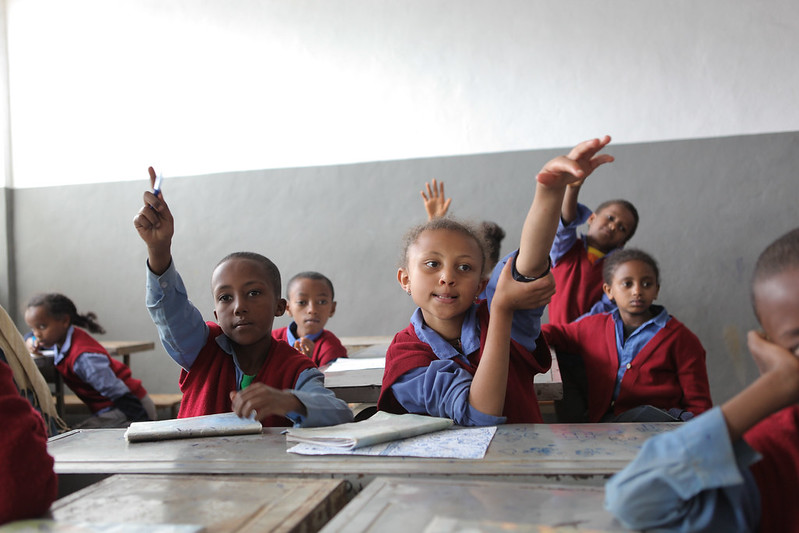How The Tomorrow School Alleviates Poverty in Ethiopia

Schooling is a proven pathway out of poverty, paving the way for higher-paying, skilled employment opportunities. However, impoverished nations, such as Ethiopia, face barriers to education and struggle with issues such as food insecurity, a lack of access to clean water and a lack of access to proper hygiene and sanitation facilities. By addressing all of these factors, impoverished people can live a better quality of life. With education, impoverished people can break generational cycles of poverty. The Tomorrow School, a German nonprofit organization formed in 2019, aims to “empower children in Ethiopia to shape their own future and to pursue their dreams on the basis of education.” By centering its work around four focal areas, the organization aims to create “a more dignified learning environment in Ethiopian schools.” Here is some information about how The Tomorrow School alleviates poverty in Ethiopia through education.
Education in Ethiopia
Ethiopia’s education sector has made strides over the past decade “with primary school net enrollment” reaching a remarkable rate of 100%. Educational progress is vital for Ethiopia’s children who make up almost 50% of the population. However, while many children in Ethiopia enroll in school, only 54% go further than the eighth grade. In addition, approximately “[63%] of students in lower primary school are not achieving the basic learning outcomes needed to succeed higher up the education ladder.”
Cultural gender norms, domestic work responsibilities, “long distances to schools” and “climate-induced and conflict-related emergencies” form the education barriers present in the country. The Tomorrow School works to provide Ethiopian children with the necessary resources to aid in their educational success. Here are four focal areas to demonstrate how The Tomorrow School alleviates poverty in Ethiopia.
4 Focal Areas of The Tomorrow School
- Clean Water: Of the 2.1 billion individuals in the world who are without access to clean drinking water, Ethiopia makes up 61 million. Girls and women shoulder the burden of walking hours to collect water, a time-consuming endeavor that leaves them with no time for paid employment or education. Often, this water comes from contaminated sources that increase the risk of waterborne diseases like typhoid fever and bilharzia. The Tomorrow School funds the construction and maintenance of safe water sources in schools to “supply the sanitary facilities, ensure a higher hygiene practice and support the school food program.”
- School Supplies: The READ II program in Ethiopia, which the U.S. Agency for International Development (USAID), conducted a survey across six Ethiopian regions and found that school supplies stand as the “second-most important factor” in reducing school dropout rates in the country. The survey also finds that school supply inadequacies are “one of the top four reasons for absenteeism” in schools. Writing utensils, paper and textbooks are essential for student engagement in classrooms. With these tools, a student can share educational information with his/her family, manage finances and problem solve outside of the school environment. According to The Tomorrow School, only 7.5% of primary school students in Ethiopia pass the national exam that allows for them to proceed to secondary education. A contributing factor to this low rate is a lack of access to school supplies and study materials that would better prepare students.
- Food: Food insecurity and hunger have severe developmental consequences for children, such as stunting, which “can affect a child’s cognitive abilities as well as their focus and concentration in school.” These impacts on brain development can equal a loss of up to four school grades. Furthermore, “stunted children are 19% less likely to be able to read by age 8.” Most recently, the World Food Programme reports that 3.9 million Ethiopian women and children are facing nutritional vulnerabilities. The Tomorrow School aims to not only provide food for students but also teach them how to cook balanced meals through a food program in Ethiopian schools where “children cook for each other.”
- Sanitation: The organization aims to improve the hygiene of students and the sanitation of schools in Ethiopia. The organization has reported that 25 million children in Ethiopia experience exposure to illness-causing germs due to inadequate hygiene facilities and supplies. A 2014 report shows that “73% of Ethiopia’s urban and 77% of its rural population used unimproved sanitation facilities.” By providing sanitary facilities, sustainable waste management and educating teachers and students on sanitary practices, The Tomorrow School helps to reduce infections and illnesses so students can continue to attend school.
Ensuring a Bright Future Through Education
Proper schooling has a significant impact on an individual’s quality of life, bringing benefits that can impact communities and entire nations. The Tomorrow School’s efforts to improve the learning environment in Ethiopian schools play a significant role in ending cycles of generational poverty in Ethiopia. The Tomorrow School alleviates poverty in Ethiopia by aiding children through education to provide clean water, school supplies, improved sanitation and food.
– Katelyn Rogers
Photo: Flickr
